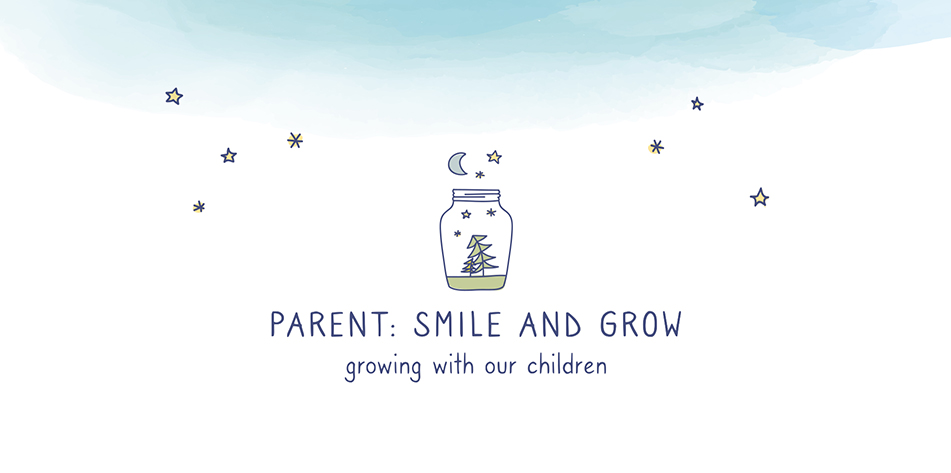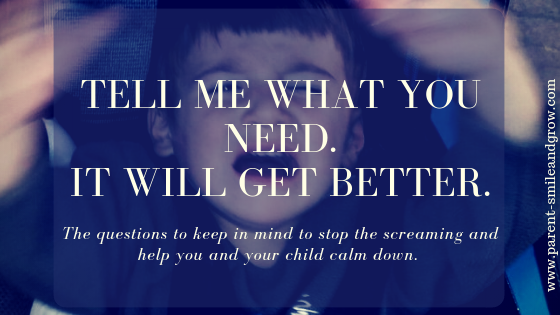I don’t know about you, but it happens to us sometimes that we introduce a small change in routine, we say a little innocent no, and..at our bewilderment, unexpected shouting and crying are the response from our children. And among the shouting we try to explain our rational motivations, only to see an increase in the intensity of the reaction.. and we end up shouting ourselves. Ever happened ? Then you wonder.. how come such a small thing could spoil mood and atmosphere? Why every so often our children start shouting and we don’t react in an effective way, thus ruin our time together?
I don’t think it’s the ugly character of our creatures (in any case, it’s better not to think so!). But a misunderstanding.. Let’s dig in!
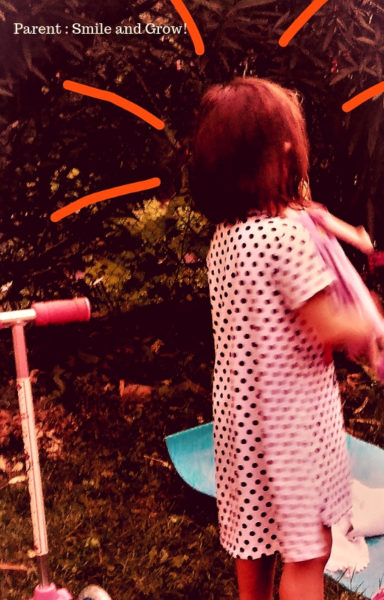
Table of Contents
Why are you shouting, my sweetheart.. ?!
It’s afternoon, I went to pick up child #2, and I set off with him to the school of daughter #1. It’s sunny, we’re calmly riding the bike, singing; in short: so far everything’s perfect. In fact, I missed the children today, I’m so happy to hug them tight.
I also naively thought: Since we unfortunately still have to go grocery shopping, why not stop at the bakery right in front of the supermarket and choose something together? A muffin or a sweet? It will be a nice surprise!
I glimpse my daughter in the courtyard from afar, she runs towards me all happy, hugs me. “Mom, Mom, did you bring me my snack?”
Here, at this moment, we cease to resemble the perfectly happy family, and we return to be the perfectly imperfect family. For a moment I had hoped.. The shouting begins.
I want the snack in my snack box! As you always do ! I want to eat what I want! I want to decide!
Picture my initial bewilderment among the screaming, the crying and the noise while, I try to breathe deeply to keep calm. After all these posts about breathing..
Stop with this shouting
Then no, it is too much; we sit on a bench and I tell her that I’ll talk to her only once she has calmed down; that I won’t take that shouting any longer.
After about twenty minutes, we manage to regain a state of calm (after the school counselor has stopped by to ask me if everything is okay .. Of course, a marvel, I’m already looking forward to the teenage crises and shouting, thanks, if you offer any discount coupons to book now a few therapy sessions, I will buy them!
)
And what comes out of the mouth of my beloved first-born? Mom, you always make us eat only healthy things; I want to decide for myself what to eat and I don’t want any vegetable!
This is because I’d proposed to buy a croissant..!
Where did this come from? Why right now? How can I teach her how to deal with this anger without bursting into desperate shouting?
Daily shouting .. another example to start understanding
Another day, another scene. We’re riding our bikes back home from school, my daughter in front of me (so she can lead). Once arrived near a traffic light to which we must turn right, I call her because I wanted to anticipate the turning point and thus avoid the red light, by getting on the sidewalk (which is allowed in that point).
Answer (the shouting begins) : Mom! Why are you turning right here?!
I try to explain, but my answer is vain, her shouting covers it : You never do what I want! I wanted to go on and then turn later! You never listen to me!
and so on.
Now, my instinctive reaction at this point is to ignore all of this shouting = sort of punishment for unwanted behavior; I will give her attention when she calms down and we can talk to each other, thus rewarding positive behavior.
But we are in the middle of the street, it’s hard for her to follow me and it annoys me to let her shouting out loud.
When my instinctive reaction is shouting too..
How dare she talk to me like that? I let the tones rise and I threaten her to stop it.
Why don’t I like this reaction ? I only increase her frustration and her anger. From experience, I saw that it will not teach her how to behave better next time (read: to calmly ask me why I made my turn earlier than expected, and to accept my answer instead of taking it as a personal affront).
Not only that, but in front of my threats usually her answer becomes even more violent in the tones, which leads to an escalation of shouting that ends up ruining most of our afternoon.
Think and breathe. Breathe and think.
For once, I am able to concentrate on my daughter and wonder the reason behind her reaction. Why turning a few meters earlier than what she had thought made her so angry?
I recently read Thomas d’Ansembourg’s book, “[eafl id=”982″ name=”Stop being nice if you’re not genuine” text=”Being Genuine: Stop Being Nice, Start Being Real”]“. The author suggests that we should start looking within ourselves to recognize our unmet basic needs, and by doing so we also learn to recognize them in others too.
The suppression of our needs entails making us violence; and sooner or later, to externalize this violence. When we look at the other person with the lens of his or her needs, we recognize the points that unite us, rather than the points that make us different .
When in front of a person with whom we are in conflict, the author invites us to ask the question :
What unsatisfied need leads him/ her to react this way ?
Of course, we can’t do this work on others if we don’t start doing it on ourselves..
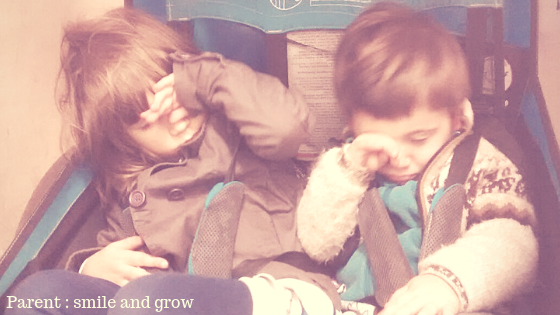
Let’s change our point of view
This point of view made me think, because it allows by a simple change in perspective to pacify a divergence.
Let’s go back to the little fight with my daughter in the middle of the street. Instead of reacting instinctively, I asked myself “what is my daughter needing?” And there, I understood.
She wanted to prove her independence. She wanted to be the leader for once, to decide where to go. With my “Turn here, so we avoid the traffic light!” I deprived her of this possibility, bringing her back to “it’s mom who commands, you’re too young” that is so tight on her.
And I just wanted to gain a few seconds!
By asking her : is this that made you angry?
the shouting immediately stopped. She answered half sad, half still offended; I apologized for not having understood her and then I explained to her my reasons once more (not a challenge to her, but a way to gain a few minutes).
For once, instead of getting to the mutual shouting, we reconciled in no time.
Collaboration!
At that moment, I think I understood the principle of positive parenthood, for which we try to establish a relationship of cooperation rather than force.
Although I always agreed on the principle, I was never able to put it into practice : although I tried to get in tune with the emotions of my children, to put myself in their shoes with all my empathy; as soon as I felt their reactions as an attack to my authority, something inside me put me on alert.
“You can’t be treated like that! You can’t be answered to that way, you’re their mother.” And I restored the authoritative before understanding what hidden need had dictated their behavior.
That is, I practically passed from one extreme to another, without being able to find a balance of loving firmness, so to speak.
Some of my deep convictions were still contrary to establishing a relationship of collaboration. Unconsciously my self-esteem about my ability to be a good mother felt undermined : “You are not even able to have them respect you!”
I didn’t realize that it was their way to ask me help them understand their emotions.. And probably even a way to ask me to be clearer in setting the limits.
My child is shouting and crying, what should I do???
When I go back and think about it, I wonder: how shall I react? Beyond understanding the need, how can I teach my daughter that her reaction is excessive? The key question for me is this : when it is ok to make a child cry, and when it is not?
Let me explain. Having read different and varied theories and opinions on this, I was (and still are) torn between the desire to show my love and my closeness to my children (message: “Mom will always be by your side even when you make choices that I disapprove of”) and the awareness of having to impose rules (message:” Mom loves you and therefore must tell you that what you just did brings negative consequences and it’s not acceptable”.)
And so: if my son start shouting at me, and cries and beats his feet on the ground because I told him he can’t watch cartoons, what should I do?
Because even if I sense his need (for example of control, of autonomy in deciding what to do), as long as he is in full crisis I can’t certainly ask him if he’s crying because he needs autonomy.
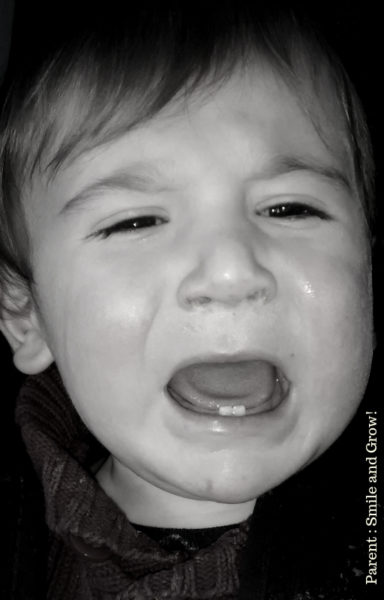
My options
Option 1 = I leave him alone until he’s calm. Don’t I send him the message that when he behaves badly, I love him a little less? And what about his immature brain and his inability to calm on his own?
Option 2 = I scold him for the disproportionate reaction. Don’t I pass the signal that expressing one’s anger is wrong? Also in this case, I read that up to about 5 years, children can’t manage their anger by themselves (you can also read this previous post).
Option 3 = I stay close to him and hug him. But thus, don’t I reward in some way his negative behavior, inciting him to repeat it?
Believe me, I am rather instinctive, but since the problem persists, I thought that changing approach could be useful, and here I am to ask myself these existential questions.
Need .. or unstoppable want?
If I think about what I’ve learnt about baby’s brain, I know that babies cannot regulate themselves, and they need an adult to teach them to calm down when an unmet need arises. Up to about 12 months, that is, when the baby cries, it is (almost) definitely because of a primary unmet need.
What exactly are primary needs? When considering Maslow’s theory, we mainly refer to the base of the pyramid: thirst, hunger, fatigue, diapers to change, fear, need for tenderness and cuddles.
Responding to these needs is essential for survival, but also for the optimal development of the brain.
But then, as the brains of our little angels mature, you also have.. desires and wants. “I want chocolate now! I don’t want this jacket! I want to run in the middle of the road!”
And we know that for their safety, we must say a few no, even at the cost of letting them cry.
So far, it’s black or white. If we accept to face the glances of passers-by, once we let our children despair once or twice because we haven’t bought them the candies they wanted, they learn it’s not worth it. The third time, they won’t cry anymore.
(Personally tested. The trick is to remain impassive. Empathetic towards the child, but impassive towards his request. Even when the old lady looks at you as if you were committing a crime. Yes, the whole supermarket followed us, because the shouting started at the fruit counter and ended up at the cash desks. But now go shopping is (almost) fun!)
The gray-zone situations
I know my son is shouting and wanted to watch TV, because he’s tired and can’t control himself. Nevertheless, I still don’t want him to watch TV..
And here, a fundamental philosophical reflection to understand in which direction to act. What is a need? What is a wish?
I often took the behavior of my children as a challenge, forgetting that often the deep reasons for their reactions are still unclear to themselves, and that I’m the one who should explain them.
Growing up, the needs to be identified become more and more sophisticated : jealousy, anger, the need for independence, the search for identity, the desire to be accepted by the group of friends at school, and so on.
Feelings are yet difficult to identify, to be associated with the underlying need and the solution that can satisfy it. It’s up to us, the adults, to guide them towards emotional independence, a task that I find particularly difficult since I myself still have difficulty understanding my own needs!
Are these real needs?
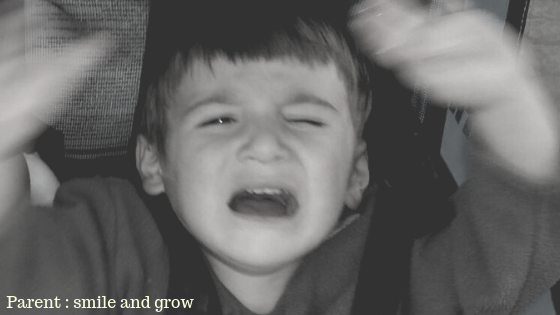
With this essential distinction in mind, I began to react with this guide ; and when the reaction results in unwanted behavior, I ask my child to stay on his/her own, in his room for example, or in a chair, in the stroller .. until he hasn’t calmed down.
And I try to stay calm and loving, without raising my voice.
Typical situation: my daughter gets angry because she has to take turns with her brother when choosing which cartoons they watch; they argue, and then she beats him. Before I can explain, before I can investigate on her deep need, I want to teach her that she must learn to control herself.
Even if it means going away from others for a few minutes when she feels that she’s about to fall under her rage, or a strong emotion; before hurting others or herself; before doing something that she may regret later. (Also she’s already 5 years old, I can now expect a little more self-control from her ..)
Wondering about our needs and preventing harmful reactions
Just the other night, before the typical situation above, I saw immediately that my daughter was tired. She began to give abrupt and impolite answers, small gestures of impatience .. I suggested her several times to go and rest a few minutes in her bed. She didn’t want to.
Then, the scene with her brother because of the cartoons. Here, when she calmed down and joined us for dinner, after hugging her, I reminded her that she didn’t want to rest, and that maybe her fatigue was too much.
I hope to be able to remind it to her next time, and that this allows her to learn identifying “need and solution” before entering the out of control phase !
I’ll let you know how the reflection evolves, I am still in the test phase 🙂
The fine balance line (between shouting and silence)
I was thinking about all this during our discussions in the parenting class at school (see previous post). I find particularly interesting to reflect upon this distinction between need and desire, precisely because I believe it intervenes in a different temporal phase.
We always have needs, is human nature right? If they were not there, we would never act. Sometimes, however, we act without being aware of the need that drives us .. and often, there are deep needs that characterize us, that distinguish our path of life.
Desire, however, is momentary, fleeting, extrinsic .. if I can bring it back to children, I would say that understanding the need prevents the crisis, even in the face of a sudden want.
And you, which need are you?
Lately, when I get annoyed by some silly things (like my son who puts tons of toothpaste on his toothbrush, or drags the chair on the wooden floor), my son smiles at me and asks: “Are you a little angry or a lot angry? You’re not angry at me, right? “
Which is obviously a winning strategy because I melt and smile and I’m not angry anymore.
But regardless; it makes me wonder : how does my child unconsciously understand how to take me, while my daughter often gets the opposite effect, to make me mad in no time? Is it just their different personalities ? Is it me? What’s behind my reaction and theirs?
Experimenting and practical conclusions
I kept thinking. My child needs harmony, he wants to feel loved. He’s very empathetic, trying to make everybody happy. Just like me. Both, we can’t stand conflict, or that someone can be angry at us. Our inner drive is to feel accepted, loved. I can understand him well, because he’s like me.
My daughter, on the other hand, needs decision-making power. Independence. If someone tramples her will, she says it loud and clear.
Little by little, reading here thinking there, an idea peeked out. I have come up with some strategies proposed by Jane Nelsen (you may find [eafl id=”983″ name=”Jane nelsen positive discipline” text=”here”] a few of her books) based on the hidden need of the child .. and I connected everything.
My son wants to feel loved and be part of us, he wants to participate, to help me; by asking him to do things for me, giving him a task to do, he reassures himself.
My daughter needs to choose .. The theme of the choice is interesting, it deserves a later post; but anyways, proposing two alternatives (both acceptable to me of course) instead of imposing one of them, is improving our relationship.
I give her choices all the time now, underlining: I’ll let you choose: X or Y?
or You pick!
. After the bike episode, before leaving, I ask : Which road do we choose, to the right or to the left?
; What kind of snack shall I bring you this afternoon, this one or that one?
Need.. from mine to theirs
And it’s magic, but having understood the deep need of my children is helping me. Before getting to the shouting-out-of-control-phase.

The analysis on me is essential : to try to recover this deep connection with my feelings and what they want to tell me. And then, I can better understand the people next to me.
I would like to be able to equip my children with this ability to listen to themselves, to avoid them part of my hard work once they become adults.
And in the meantime I would also like to avoid any attention from the psychologists of our neighborhood .. and instead teach my children two or three techniques to manage the emotional waves, before we get to puberty !
Do you experience similar episodes? Tell us all about them! How do you react? What works well for you? Comment here below!
